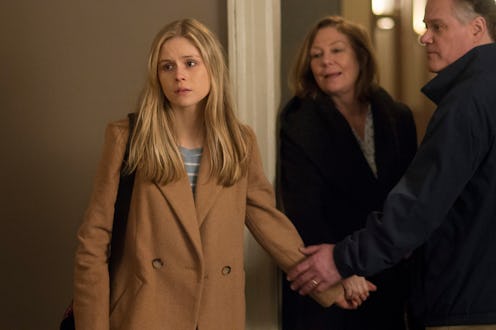
From the moment its very first trailer was released, it was clear that Jessica Jones is a feminist show. Just a brief glimpse at the titular hero of Marvel's latest Netflix series is enough to show her strength, in every sense of the word. Once you begin watching the show, however, it quickly becomes clear that the same can be said of every character, especially Hope Shlottman, a girl Jessica becomes committed to helping after Kilgrave terrorizes her in nearly the same way he did Jessica. Spoilers through Episode 6 ahead. Through Hope's storyline, Jessica Jones addresses abortion, and even though the storyline happens amidst the heightened drama of a superhero world, the series handles it realistically and sensitively.
Throughout the first half of Jessica Jones, Hope has a tragic, but important role. Like he did to Jessica years before, Kilgrave used his powers to control Hope, culminating in forcing her to kill her parents. In Episode 6, "AKA You're a Winner!," as she awaits trial for the murder in prison, Hope tells Jessica that she is pregnant as a result of being raped by Kilgrave while she was under his control. Desperate not to continue the pregnancy, she pays another inmate to beat her, hoping it would result in a miscarriage. When that is unsuccessful, she asks Jessica to get her medication that will cause an abortion. In the pair's conversations about Hope's decision, the writing paints a realistic picture of a woman choosing abortion, something that though featured in Marvel Comics, has not been portrayed in a live-action adaptation.
Though Kilgrave uses superpowers to control others' actions, Jessica Jones repeatedly reminds the audience that what he did to both Jessica and Hope was rape. He forced them to buy lingerie, spend the night in a fancy hotel, and have sex with him, all against their will. The villain often tries to convince Jessica otherwise, even once telling her "I hate that word" when she reminds him that he raped her, but she is resolute in confronting him with his own crimes. This personal history with Kilgrave drives Jessica to protect Hope, letting down her tough demeanor as she sits next to the young girl in the prison hospital.
Hope tells Jessica why she first tried to end the pregnancy with a beating, explaining that a doctor couldn't see her for two months (presumably to perform the abortion she wants), which is all too realistic. In 2009 The Guttmacher Institute, a research institute that aims to "advance sexual and reproductive health and rights," claimed that many U.S. prisons make it difficult for inmates to get abortions, even when they are legally allowed. Though a more extreme example, Hope being faced with a long wait before getting an abortion is also reminiscent of real-life mandatory abortion delays in some states — something the Huffington Post reported the World Health Organization has advised against — that can range from 24-72 hours, with certain states requiring a woman visit a clinic multiple times before receiving one, according to a 2015 report from the Guttmacher Institute.
When Jessica offers to have Hope's lawyer move the appointment up, Hope explains why it's so important to her to end the pregnancy as quickly as possible, saying, "every second it's there, I get raped again and again; my parents are shot again and again." She continues, "I wanna live, I wanna have children, but I won’t give life to this thing. I won’t do it." For Hope, the pregnancy serves as a reminder of the trauma she endured, something that the 2012 New Yorker article "The Legitimate Children of Rape" explained some real women in similar situations can experience, especially in this quote from British psychoanalyst Joan Raphael-Leff.
The woman feels she has growing inside her part of a hateful or distasteful Other. Unless this feeling can be resolved, the fœtus who takes on these characteristics is liable to remain an internal foreigner, barely tolerated or in constant danger of expulsion, and the baby will emerge part-stranger, likely to be ostracized or punished.
Jessica Jones continues its realistic depiction in a later scene from the episode, when Jessica returns to the hospital with the abortion-inducing pill. Before giving Hope the medication, Jessica warns her, "Once you take this, there's no do-overs. You’ll be sick as sh*t for about eight hours, so I need you to be 1000 percent sure.” This scene shows that neither woman is taking the decision lightly, and that both have thought about the situation a lot — because getting an abortion is an important decision. In response, Hope immediately takes the pill, showing just how certain she is, and how important it is to her that she does not continue the pregnancy.
By swallowing that pill, Hope made a real, difficult decision, on a series about a woman with super strength trying to stop a man with mind control powers in the same world where The Avengers exist. Still, Jessica Jones managed to depict a more truthful storyline about rape and abortion and the emotions they can bring than most shows with more realistic premises. It also did so sensitively, highlighting the repercussions of rape felt by both Hope and Jessica, and their struggles to recover from their traumas. It doesn't matter that superpowers were involved; the episode provides just as much of an emotional impact because of the dialogue these women share.
Jessica says later in the episode, "Some a**holes would call Hope 'selfish,'" but Jessica Jones portrayed Hope's story with more than enough sympathy and strength to ensure that only a villain like Kilgrave would ever dare say such a thing.
Images: Myles Aronowitz/Netflix; jessicajonessource/Tumblr (2)